The Thinking Pianist: the highlight of my year
A transformational summer residential course at Cheltenham Ladies College
This post diverges from my usual focus on creativity, but with good reason: next July, I think you should come to The Thinking Pianist summer residential course.
I’ve just finished attending for the second time. It is one of the most amazing things I have ever experienced. It was transformative when I first attended last year and this year’s course was equally wonderful. It finished just a couple of days ago and my mind, heart and soul are full to the brim.
The Thinking Pianist ticks all the boxes
The Thinking Pianist is not your average piano course but, naturally, it does share many of the features of other similar courses, including:
piano lessons, lectures and workshops with some exceptional concert pianists and teachers on a wide variety of themes
high-quality concerts by the teaching faculty. This year I was blown away by Tim Horton’s performance of the second book of Debussy Preludes, and absolutely overwhelmed by Mengyang Pan and Enrico Elisi’s joyful performance of Mozart’s Sonata for Two Pianos, one of the most life-affirming musical experiences I have ever had
your own private practise room and the opportunity to play and perform on some outstanding grand pianos, including a gorgeous new Bösendorfer that is so new that it doesn’t feature in the linked list
a gorgeous venue, with several wonderful performance spaces. Amongst them the Princess Hall stands out as particularly stunning, but I have a soft spot for the more intimate Council Room with its Arts and Crafts style
a series of talks and workshops on piano pedagogy, run by the wonderful Andrew Eales of PianoDao and course director David Jones. I’ve attended this both years, and it has really enriched my teaching
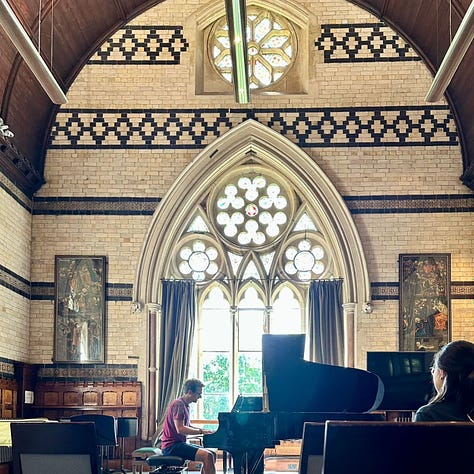
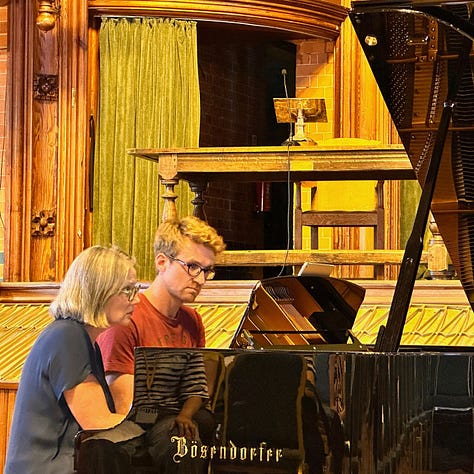
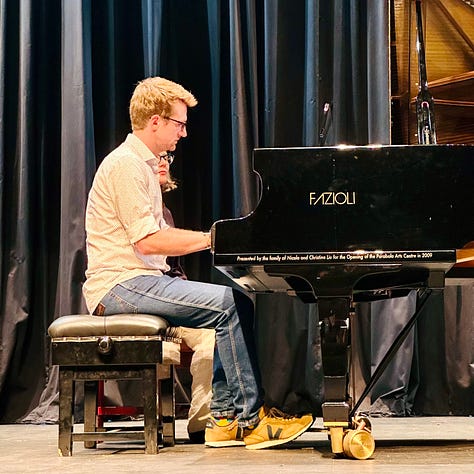
But The Thinking Pianist is more than just a piano course
What sets The Thinking Pianist apart from its peers is its focus on wellbeing. As pianists, we are often so focused on our musical development that we forget to take care of the body, mind and soul that sustain our music. That leads to physical problems such as RSI, focal dystonia, etc., and mental problems like anxiety and burnout. It can also lead to what for want of a more precise word I’m going to call spiritual problems: feeling unfulfilled in our work, experiencing lack of purpose or a sense of drifting through life.
In order to address this, The Thinking Pianist is designed with wellbeing at its core. It achieves its goal spectacularly.
Alongside all of the musical workshops, lectures and lessons, there is/are:
Alexander technique training
tai chi training
daily yoga / tai chi warmup sessions
lectures and workshops that focus on healthy piano technique — in 2023 Penelope Roskell was a visiting faculty member
private wellbeing chats with the extraordinarily empathic Katie Maughling, a holistic health coach and someone who has swiftly become one of my favourite people
teachers who take your individual needs seriously
But it goes deeper than that. The whole ethos of the course is kind, generous, and humane. The faculty are genuine, lovely people who don’t hold themselves aloof from the students, but treat them as equals. We all sit down together at mealtimes and tea breaks and chat freely. They are open-minded and curious and, as a result, the learning goes both ways: as Mengyang Pan said at one point this week, “I teach in order to learn”. These are funny people who love to laugh, and they clearly care about their students. As a result, there is an exceptionally supportive, convivial atmosphere amongst the faculty and students.
I’ve been quite fortunate with my musical experiences to date but I have never, ever experienced such a supportive group of musicians. It was a joy to be amongst them.
There is a lovely range of students, ranging from some who have only been playing for a few years via some very experienced and serious amateur players to some retired professionals. There’s also an international mix, with people travelling from North America and continental Europe (myself included). Although the backgrounds are varied, what unites the group is a deep love for music, a sensitivity to individual needs, and that supportive attitude that I’ve mentioned several times.
Indeed, after loving last year’s course, I gushed about it to my friend and colleague Rhonda Rizzo, who attended this year’s course and had an absolute blast. I’m sure you’ll see a post about it soon over on her site, NoDeadGuys.com.
Course Director: David Jones
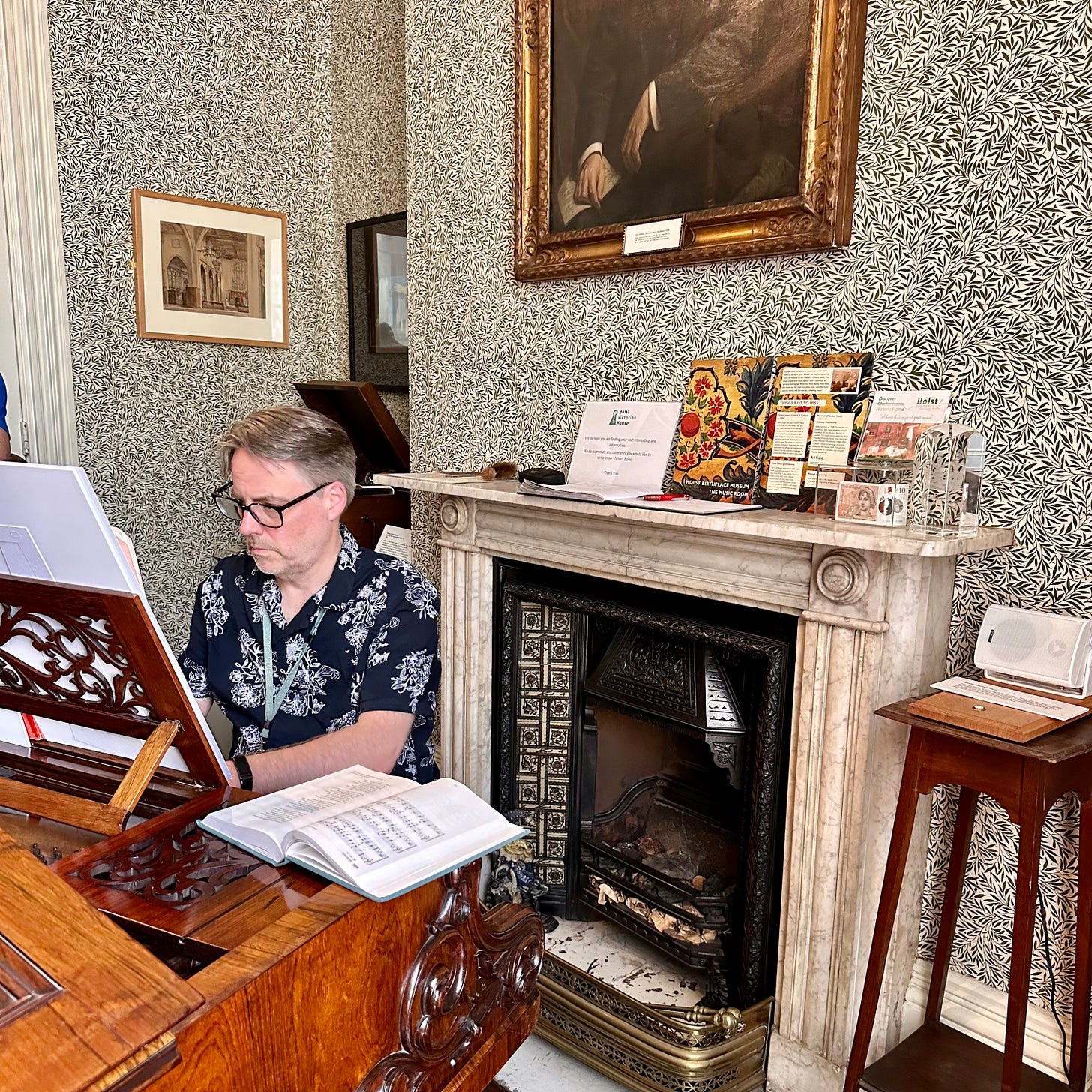
At the centre of The Thinking Pianist is the course director, David Jones. David is Head of Keyboard Studies at Cheltenham Ladies College and has an impressive CV as a performer and educator but what CVs cannot show—what you can only experience by spending time with someone—is the quality of a person’s character.
David Jones is one of those rare people who not only has a good soul, but also has the talent, vision and the working ethic to actually effect positive change in the world.
It’s not my place to tell the story of what led him to create the course, but you should be sure to attend his talk early in the course. Suffice to say I find him utterly remarkable and very inspiring. Given the right support, I am sure he will become widely known as someone who has transformed music education for the better. High praise, I know, but well deserved.
It is not perfect
I love this course and have great affection for the people who run it, which is why I’ve written such an effusive post, but for balance I do need to be clear that the course is not perfect. To begin with, there are two things you should be aware of regarding the site.
Accessibility
Cheltenham Ladies College is a stunning place, but like many of the buildings in Cheltenham, it was built before accessibility for disabled people was considered to be important. Although many steps have been taken to make the college more accessible, it is not the easiest place to get around if you have restricted movement. The course accommodation is not directly on the main site where the teaching takes place—last year’s accommodation was about 5 minutes brisk walk from the main site, this year’s was about 10 minutes—and the pavement between the accommodation and teaching site is uneven in some places and includes a slope. In the accommodation and teaching sites there are many stairs and steps but fewer ramps and elevators: I believe it is possible to access most or all of the site, but you may not find it easy. If you experience impaired movement, I recommend discussing your needs with the course team before you book.
Boarding houses
Talking of the accommodation: if you choose to stay at the college’s own accommodation, bear in mind that you will be sleeping in a boarding house designed to accommodate teenage girls. Be aware that:
the beds tend to be quite small (and if you like having two pillows, you should bring one of your own)
the sound-proofing is not great so if you are sensitive to noise, you would be advised to bring earplugs
toilets and showers will be shared (you‘ll probably have a washbasin in your room)
there is no air-conditioning and the bedrooms can become quite stuffy in hot weather, so you may want to bring a fan
Several of the regular course attendees choose not to stay in the college accommodation but instead hire an apartment in the city. I can understand that decision. I’ve stayed in the college accommodation both years and I’ll do it again next year, but I can’t honestly say that I love it; it’s fine, but it’s not great.
That being said, there was so much going on in the course that I spent very little time in my room.
Genre
Besides the site, you should be aware that the lectures, workshops and recitals all focused predominantly on performing classical music. There are exceptions to this:
every year there is an extremely fun free-improvisation workshop
the faculty and students proved to be very encouraging and receptive to my own improvisations and compositions
in my private classes, Andrew Eales demonstrated a deep knowledge of improvisation and composition that I found very useful
But overall there’s no denying that I am something of an oddball, with most people focusing on learning how to play and perform classical music. That’s fine—it’s great, after all!—but I’d love it if there was a wider range of genres and approaches explored and I would guess that as the course expands over the next years, this may broaden too. Certainly the faculty seem to be refreshingly open-minded.
Summary
With those caveats given, it really is no hyperbole to say that in my 39 years on this planet, my time at The Thinking Pianist is amongst the most profound, enjoyable and transformative I’ve experienced. I’ll repeat what I wrote above: my mind, heart and soul feel full to the brim.
Thanks so much to David Jones for creating this amazing experience and to Cheltenham Ladies College for supporting him to do so. I hope to see you at The Thinking Pianist 2025!


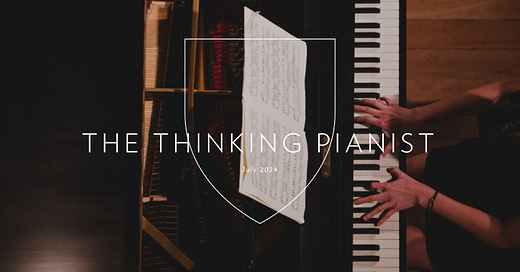



Lovely to read this very nice précis, and it was great to catch you down there 😊
I do love how important and transformational it seems to have been for you in these first few years, and excited to see how that follows through and impacts on what you do in the year ahead.
Am I going to get a monthly reminder email/text about whether I'm coming next year now?!?! 😉😂
A good read, thank you.